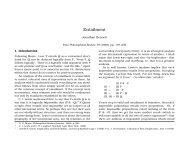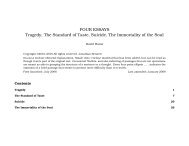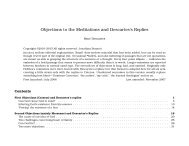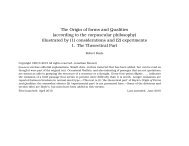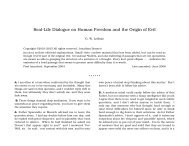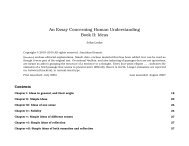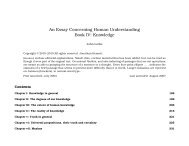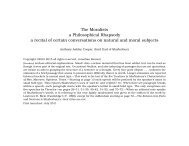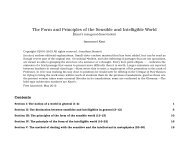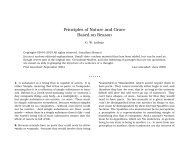A Vindication of the Rights of Woman with - Early Modern Texts
A Vindication of the Rights of Woman with - Early Modern Texts
A Vindication of the Rights of Woman with - Early Modern Texts
You also want an ePaper? Increase the reach of your titles
YUMPU automatically turns print PDFs into web optimized ePapers that Google loves.
The <strong>Rights</strong> <strong>of</strong> <strong>Woman</strong> Mary Wollstonecraft 1: Human right and duties<br />
A standing army, for instance, is incompatible <strong>with</strong><br />
freedom because strictness and rank are <strong>the</strong> very sinews<br />
<strong>of</strong> military discipline; and despotism is necessary to give<br />
vigour to enterprises that have one person in charge. A spirit<br />
inspired by romantic notions <strong>of</strong> honour—a kind <strong>of</strong> morality<br />
based on <strong>the</strong> fashion <strong>of</strong> <strong>the</strong> times—can be felt by only a few<br />
<strong>of</strong>ficers, while <strong>the</strong> main body must be moved by command,<br />
like <strong>the</strong> waves <strong>of</strong> <strong>the</strong> sea; for <strong>the</strong> strong wind <strong>of</strong> authority<br />
pushes <strong>the</strong> crowd <strong>of</strong> subalterns forward, <strong>the</strong>y scarcely know<br />
or care why, <strong>with</strong> headlong fury. [Then as now, ‘subaltern’ mainly<br />
meant ‘junior <strong>of</strong>ficer’, so <strong>the</strong> ‘main body’ presumably refers to <strong>the</strong> main<br />
body <strong>of</strong> <strong>the</strong> <strong>of</strong>ficers. The rank and file are not being talked about here.]<br />
·And armies are harmful in ano<strong>the</strong>r way·. Nothing can<br />
damage <strong>the</strong> morals <strong>of</strong> <strong>the</strong> inhabitants <strong>of</strong> country towns as<br />
much as <strong>the</strong> occasional residence <strong>of</strong> a set <strong>of</strong> idle superficial<br />
young men whose only occupation is gallantry, and whose<br />
polished manners make vice more dangerous by concealing<br />
its ugliness under gay ornamental drapery. An air <strong>of</strong> fashion,<br />
which is really a badge <strong>of</strong> slavery, showing that <strong>the</strong> soul<br />
doesn’t have a strong individual character, awes simple<br />
country people into imitating <strong>the</strong> vices when <strong>the</strong>y can’t catch<br />
<strong>the</strong> slippery graces <strong>of</strong> social polish. Every military body is a<br />
chain <strong>of</strong> despots who obey and give commands <strong>with</strong>out using<br />
<strong>the</strong>ir reason, and become dead weights <strong>of</strong> vice and folly on<br />
<strong>the</strong> community. A man <strong>of</strong> rank or fortune whose connections<br />
guarantee that he will rise has nothing to do but to pursue<br />
some extravagant whim; while <strong>the</strong> needy gentleman who has<br />
to rise ‘by his merit’, as <strong>the</strong>y say, becomes a servile parasite<br />
or a vile pander [= ‘pimp’, or perhaps merely ‘person whose job it is to<br />
satisfy his superiors’ desires’.]<br />
Sailors, <strong>the</strong> gentlemen <strong>of</strong> <strong>the</strong> navy, can be described in<br />
similar terms, except that <strong>the</strong>ir vices [see Glossary] are different<br />
and grosser. They are more positively indolent [= ‘wholly<br />
idle’, ‘idly idle’] when <strong>the</strong>y aren’t performing <strong>the</strong> ceremonials<br />
11<br />
required by <strong>the</strong>ir rank, whereas <strong>the</strong> insignificant fluttering<br />
<strong>of</strong> soldiers could be called ‘active idleness’. More confined to<br />
<strong>the</strong> society <strong>of</strong> men, sailors acquire a fondness for humour<br />
and mischievous tricks; while soldiers, who are <strong>of</strong>ten in <strong>the</strong><br />
company <strong>of</strong> well-bred women, are infected <strong>with</strong> a ‘sensitive’<br />
whiny way <strong>of</strong> speaking. But whe<strong>the</strong>r someone indulges in<br />
·<strong>the</strong> sailor’s· horse-laugh or ·<strong>the</strong> soldier’s· polite simper, mind<br />
is equally out <strong>of</strong> <strong>the</strong> question.<br />
[This next paragraph refers to <strong>the</strong> Anglican church, <strong>of</strong> which MW was<br />
a member. A patron was a person, not himself a cleric, who had sole<br />
control over who became <strong>the</strong> well-paid rector or senior parson <strong>of</strong> a<br />
parish; and a curate was a junior parson who did most <strong>of</strong> <strong>the</strong> parish<br />
work and received a tiny fraction <strong>of</strong> <strong>the</strong> rector’s income.]<br />
Let me extend <strong>the</strong> comparison to a pr<strong>of</strong>ession where <strong>the</strong>re is<br />
certainly more mind to be found—<strong>the</strong> clergy. They have better<br />
opportunities for improvement, but rank almost equally<br />
cramps <strong>the</strong>ir faculties. The blind submission to forms <strong>of</strong><br />
belief that is imposed at college serves as a training for<br />
<strong>the</strong> curate who most obsequiously respects <strong>the</strong> opinion <strong>of</strong><br />
his rector or patron—or he does if he means to rise in his<br />
pr<strong>of</strong>ession. There can hardly be a more striking contrast<br />
than between •<strong>the</strong> servile, dependent manner <strong>of</strong> a poor curate<br />
and •<strong>the</strong> top-<strong>of</strong>-<strong>the</strong>-world manner <strong>of</strong> a bishop. And<br />
MW’s next phrase: <strong>the</strong> respect and contempt<br />
perhaps meaning: <strong>the</strong> little respect and great contempt<br />
<strong>the</strong>y inspire makes <strong>the</strong> work <strong>the</strong>y do in <strong>the</strong>ir separate functions<br />
equally useless.<br />
It is important to understand that every man’s character<br />
is to some extent formed by his pr<strong>of</strong>ession. A man <strong>with</strong><br />
a good mind may reflect his pr<strong>of</strong>ession only in superficial<br />
ways that wear <strong>of</strong>f as you trace his individuality; while weak,<br />
common men have hardly any character except what belongs<br />
to <strong>the</strong>ir pr<strong>of</strong>ession. . . .



